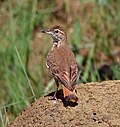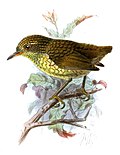Geositta
| Geositta | |
|---|---|

| |
| Slender-billed miner (Geositta tenuirostris) | |
| Scientific classification | |
| Domain: | Eukaryota |
| Kingdom: | Animalia |
| Phylum: | Chordata |
| Class: | Aves |
| Order: | Passeriformes |
| Family: | Furnariidae |
| Genus: | Geositta Swainson, 1837 |
| Type species | |
| Geositta anthoides Swainson, 1838 | |
| Species | |
|
11, see text | |
Geositta is a genus of passerine birds in the ovenbird family, Furnariidae. They are known as miners (not to be confused with the unrelated miners, Manorina, of Australia) due to the tunnels they dig for nesting. There are 11 species including the campo miner (Geositta poeciloptera) which was formerly classified in a genus of its own, Geobates. They inhabit open country in South America, particularly the Andean and Patagonian regions. They are ground-dwelling birds, somewhat resembling the larks and wheatears of other continents. They are mostly drab brown in coloration and often have a fairly long and slender bill.[1]
Taxonomy
The genus Geositta was introduced in 1837 by the English naturalist William Swainson to accommodate a single species, Geositta anthoides which is therefore the type species by monotypy.[2] Swainson formally described the type species in the following year in his Animals in Menageries.[3] The name Geositta anthoides is considered as a junior synonym of Alauda fissirostris which had been described in 1835 by the German naturalist Heinrich von Kittlitz.[4][5] The taxon is now treated as a subspecies of the common miner with the trinomial name Geositta cunicularia fissirostris.[6] The genus name Geositta combines the Ancient Greek γεω-/geō- meaning "ground-" or "earth-" with the genus Sitta that had been introduced for the Eurasian nuthatch in 1758 by Carl Linnaeus.[7]
The following cladogram showing the relationship between the species is based on a large molecular phylogenetic study of the suboscines by Michael Harvey and collaborators that was published in 2020.[8]
| Geositta |
| ||||||||||||||||||||||||||||||||||||||||||||||||||||||||||||
Species list
The genus contains 11 species:[6]
| Image | Scientific name | Common Name | Distribution |
|---|---|---|---|
 |
Geositta peruviana | Coastal miner | Peru |
 |
Geositta cunicularia | Common miner | Chile, Argentina and Uruguay, parts of Peru and Bolivia and in southernmost Brazil |
 |
Geositta tenuirostris | Slender-billed miner | Argentina, Bolivia, Chile, Ecuador, and Peru |
 |
Geositta antarctica | Short-billed miner | Santa Cruz Province and Tierra del Fuego |
 |
Geositta isabellina | Creamy-rumped miner | Argentina and Chile |
 |
Geositta saxicolina | Dark-winged miner | Peru |
 |
Geositta maritima | Greyish miner | Chile and Peru |
 |
Geositta punensis | Puna miner | Argentina, Bolivia, Chile, and Peru |
 |
Geositta rufipennis | Rufous-banded miner | Argentina, Bolivia, and Chile |
 |
Geositta poeciloptera | Campo miner | Brazil and far northeastern Bolivia |
 |
Geositta crassirostris | Thick-billed miner | Peru |
References
- ^ Ridgely, Robert S.; Tudor, Guy (2009). Birds of South America: Passerines. Helm Field Guides. London: Christopher Helm. pp. 263–265. ISBN 978-1-408-11342-4.
- ^ Swainson, William John (1837). On the Natural History and Classification of Birds. Vol. 2. London: Longman, Rees, Orme, Brown, Green & Longman and John Taylor. pp. 317–318, Fig. 283.
- ^ Swainson, William John (1838). Animals in Menageries. The Cabinet Cyclopedia. London: Longman, Orne, Brown, Green, Longmans and Taylor. p. 323, No. 129.
- ^ Kittlitz, Heinrich von (1835). "Über einige vögel von Chili, beobachtet im März und anfang April 1827". Mémoire Présentés à L'Académie Impériale des Sciences de Saint Pétersbourg par Divers Savans et dans ses Assemblées (in German): 464-472 [468].
- ^ Dickinson, E.C.; Christidis, L., eds. (2014). The Howard & Moore Complete Checklist of the Birds of the World. Vol. 2: Passerines (4th ed.). Eastbourne, UK: Aves Press. p. 107. ISBN 978-0-9568611-2-2.
- ^ a b Gill, Frank; Donsker, David; Rasmussen, Pamela, eds. (August 2024). "Ovenbirds, woodcreepers". IOC World Bird List Version 14.2. International Ornithologists' Union. Retrieved 20 December 2024.
- ^ Jobling, James A. "Geositta". The Key to Scientific Names. Cornell Lab of Ornithology. Retrieved 20 December 2024.
- ^ Harvey, M.G.; et al. (2020). "The evolution of a tropical biodiversity hotspot". Science. 370 (6522): 1343–1348. doi:10.1126/science.aaz6970. A high resolution version of the phylogenetic tree in Figure 1 is available from the first author's website here.

